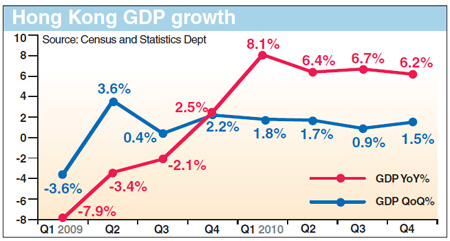GDP growth to ease in 2011
Updated: 2011-02-24 07:01
By Emma An(HK Edition)
|
|||||||

|
Fireworks light up Victoria Harbour during the lunar new year celebration. Weak recovery prospects in the US and Europe will overshadow the city's trade performance. Mike Clarke / AFP |
Hong Kong's GDP growth is expected to ease to around 4-5 percent in 2011 from 6.8 percent in 2010 as exports are expected to slow, Financial Secretary John Tsang said Wednesday.
Underpinned by booming exports and robust domestic consumption, Hong Kong's economy staged a better-than-expected recovery in 2010 after contracting 2.7 percent in 2009 at the trough of the financial crisis. During the fourth quarter of 2010, GDP expanded by 6.2 percent.
For 2010 as a whole, Hong Kong's export of goods expanded 17.3 percent after dipping 12.7 percent in 2009. But growth is expected to moderate this year partly due to a relatively high base of comparison, according to an anonymous government official.
Meanwhile, the weak recovery prospects seen in the US and Europe will overshadow Hong Kong's trade performance as the bulk of the city's exports are bound to these markets. But strong demand within Asia will continue to provide a cushion.
"The relatively stronger growth sustained by the mainland and Asian economies will continue to benefit Hong Kong," Tsang said on Wednesday while announcing the 2011-12 budget. "But the relatively fragile economic recovery of the US and Europe will make this year a testing time for the export performance of Asia and Hong Kong."
However, domestic consumption will likely remain as robust as in 2010, the government official noted, which will help prop up overall economic growth.
Total private consumption expenditure increased by 5.8 percent in 2010, following a slight rise of 0.6 percent in 2009. With the upturn in the overall economy, the job market improved significantly in the past year. For the year as a whole, the jobless rate averaged at 4.3 percent. That rate, however, has fallen to 3.8 percent for the three months ended January 2011, the lowest since the three-month period between August and October 2008.
Looking ahead, the financial secretary doesn't expect to see significant improvements being made in the job market. "As the unemployment rate has already fallen back to a relatively low level, there will be limited room for further significant decline," said Tsang. He added that the government will keep a close eye on the implementation of the minimum wage to be launched in May and how it will impact the jobless rate.
Among other challenges, the upside risk to the city's inflation may be the most disconcerting, with the headline and underlying inflation rates for 2011 now predicted to average at 4.5 percent. The "soft US dollar" and "possible sustained increase in global food and commodity prices" will be part of the reason for increased inflation, Tsang noted. However, "a more noticeable effect", according to him, will come from "the continued rise in the mainland's food prices and local rents".
The average inflation rate for 2010 was 2.4 percent. Stripping away the effects of the government's one-off relief measures, the average underlying inflation rate was 1.7 percent.
"Fighting inflation is our major task this year," said Tsang. The financial secretary pledged to ease mounting inflationary pressures by "forestalling property market exuberance, preventing excessive credit growth and pursuing a prudent fiscal policy".
China Daily

(HK Edition 02/24/2011 page3)
